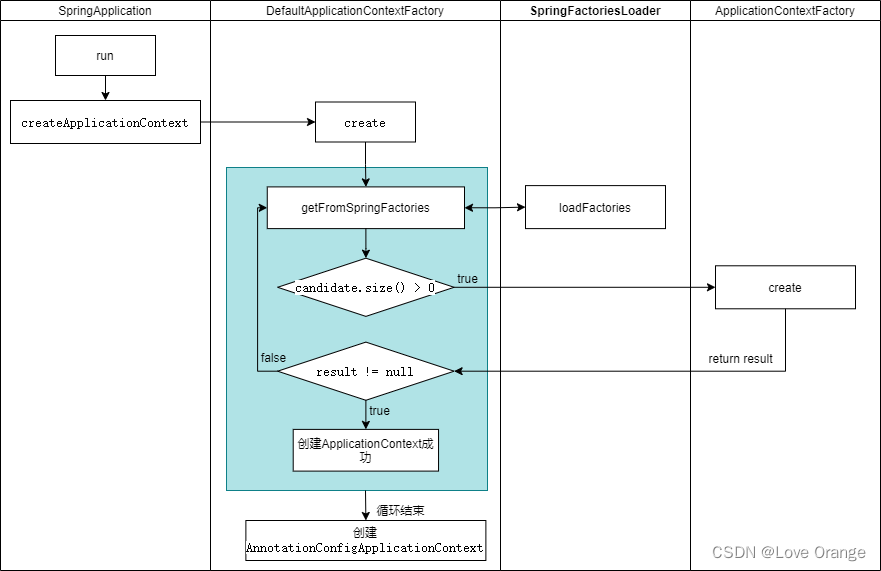ApplicationContext在Spring Boot中是如何创建的?
一、ApplicationContext在Spring Boot中是如何创建的?

1. SpringApplication
ApplicationContextFactory有三个实现类,分别是AnnotationConfigReactiveWebServerApplicationContext.Factory、AnnotationConfigServletWebServerApplicationContext.Factory、DefaultApplicationContextFactory。
public ConfigurableApplicationContext run(String... args) {
...
// 创建ApplicationContext
context = createApplicationContext();
...
}
// 调用DefaultApplicationContextFactory的create
protected ConfigurableApplicationContext createApplicationContext() {
return this.applicationContextFactory.create(this.webApplicationType);
}
2. DefaultApplicationContextFactory
下面有一点代码SpringFactoriesLoader.loadFactories(ApplicationContextFactory.class, getClass().getClassLoader()),是从org.springframework.boot的META-INF/spring.factories寻找ApplicationContextFactory的实现类,也就是AnnotationConfigReactiveWebServerApplicationContext.Factory和AnnotationConfigServletWebServerApplicationContext.Factory。
@Override
public ConfigurableApplicationContext create(WebApplicationType webApplicationType) {
try {
return getFromSpringFactories(webApplicationType, ApplicationContextFactory::create,
AnnotationConfigApplicationContext::new);
}
catch (Exception ex) {
throw new IllegalStateException("Unable create a default ApplicationContext instance, "
+ "you may need a custom ApplicationContextFactory", ex);
}
}
private <T> T getFromSpringFactories(WebApplicationType webApplicationType,
BiFunction<ApplicationContextFactory, WebApplicationType, T> action, Supplier<T> defaultResult) {
for (ApplicationContextFactory candidate : SpringFactoriesLoader.loadFactories(ApplicationContextFactory.class,
getClass().getClassLoader())) {
// 判断应用属于三种NONE、SERVLET、REACTIVE类型中的哪种类型,实例化对应类型的ApplicationContenxt。
T result = action.apply(candidate, webApplicationType);
if (result != null) {
return result;
}
}
// 创建AnnotationConfigApplicationContext
return (defaultResult != null) ? defaultResult.get() : null;
}
二、AnnotationConfigServletWebServerApplicationContext构造函数做了什么事情?
public AnnotationConfigServletWebServerApplicationContext() {
this.reader = new AnnotatedBeanDefinitionReader(this);
this.scanner = new ClassPathBeanDefinitionScanner(this);
}
1. AnnotatedBeanDefinitionReader
public AnnotatedBeanDefinitionReader(BeanDefinitionRegistry registry, Environment environment) {
Assert.notNull(registry, "BeanDefinitionRegistry must not be null");
Assert.notNull(environment, "Environment must not be null");
this.registry = registry;
this.conditionEvaluator = new ConditionEvaluator(registry, environment, null);
AnnotationConfigUtils.registerAnnotationConfigProcessors(this.registry);
}
AnnotationConfigUtils.registerAnnotationConfigProcessors(this.registry);注册了以下6个bean。
- org.springframework.context.annotation.internalConfigurationAnnotationProcessor
- org.springframework.context.annotation.internalAutowiredAnnotationProcessor
- org.springframework.context.annotation.internalCommonAnnotationProcessor
- org.springframework.context.annotation.internalPersistenceAnnotationProcessor
- org.springframework.context.event.internalEventListenerProcessor
- org.springframework.context.event.internalEventListenerFactory
2. ClassPathBeanDefinitionScanner
public ClassPathBeanDefinitionScanner(BeanDefinitionRegistry registry, boolean useDefaultFilters,
Environment environment, @Nullable ResourceLoader resourceLoader) {
Assert.notNull(registry, "BeanDefinitionRegistry must not be null");
this.registry = registry;
if (useDefaultFilters) {
registerDefaultFilters();
}
setEnvironment(environment);
setResourceLoader(resourceLoader);
}
registerDefaultFilters 注册了以下的过滤器
protected void registerDefaultFilters() {
this.includeFilters.add(new AnnotationTypeFilter(Component.class));
// 这个ClassLoader是干什么的???
ClassLoader cl = ClassPathScanningCandidateComponentProvider.class.getClassLoader();
try {
this.includeFilters.add(new AnnotationTypeFilter(
((Class<? extends Annotation>) ClassUtils.forName("javax.annotation.ManagedBean", cl)), false));
logger.trace("JSR-250 'javax.annotation.ManagedBean' found and supported for component scanning");
}
catch (ClassNotFoundException ex) {
// JSR-250 1.1 API (as included in Java EE 6) not available - simply skip.
}
try {
this.includeFilters.add(new AnnotationTypeFilter(
((Class<? extends Annotation>) ClassUtils.forName("javax.inject.Named", cl)), false));
logger.trace("JSR-330 'javax.inject.Named' annotation found and supported for component scanning");
}
catch (ClassNotFoundException ex) {
// JSR-330 API not available - simply skip.
}
}
- Component.class
- javax.annotation.ManagedBean
- javax.inject.Named